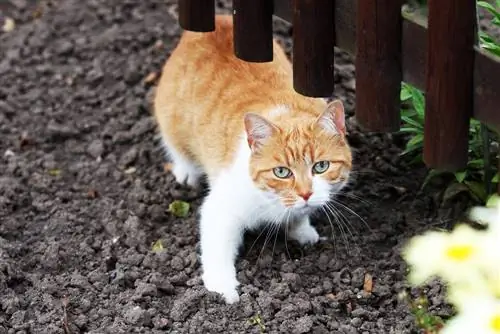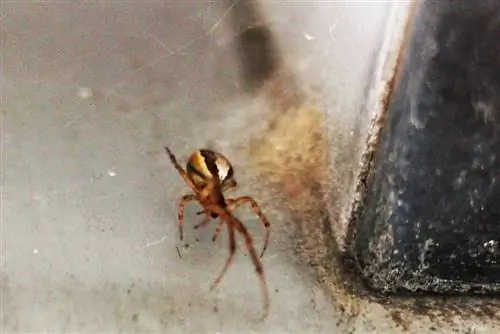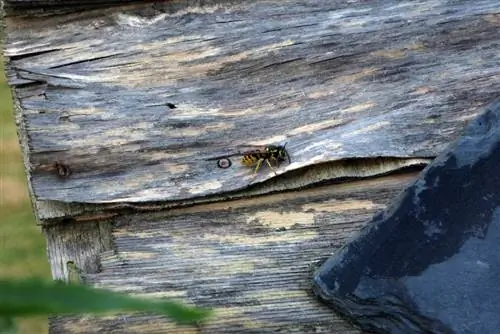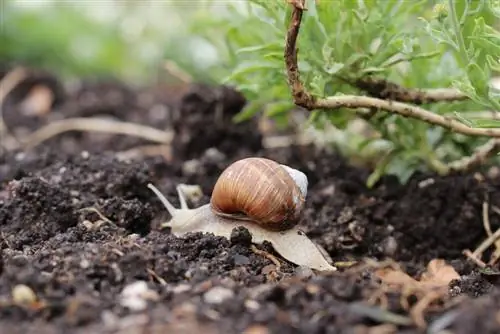- Author admin caroline@plants-knowledge.com.
- Public 2023-12-17 03:39.
- Last modified 2025-01-24 12:45.
Some people count purring house cats as their housemates, while others get extremely upset when strange cats visit their garden. To some extent with good reason, as cats dig up the earth, lounge on germinating seeds and stalk songbirds. But there are definitely options that both cat lovers and garden owners can get along with.
Essentials of the cat
Of all our pets, the cat takes first place. She is easy to care for, keeps herself busy when no one has time for her, and you don't have to walk her. Outdoor animals find their way out alone, unfortunately sometimes to the chagrin of those in the surrounding area. Cats have a strong desire to explore. Curiosity is in their nature. Ultimately, cats are still predators with very keen hunting instincts. Prey could be lurking anywhere, which is why the surrounding area is always examined very carefully. The typical characteristics of a cat can be described as follows:
- curious
- smart
- stubborn
- independent
- sovereign
- moody
- playful
- cuddly
- watershy
- noise sensitive
If you know a cat's characteristics, you can deal with it better and know which measures work and which don't. However, there are very temperamental and, in contrast, rather shy, reserved individuals. All cats have one thing in common: they love freedom.
Tip:
According to a ruling, the mandatory tolerance of outdoor cats reaches its limit with two animals. Since the definition of the legal situation is quite imprecise, it depends on the individual case, which is why experts first recommend talking to the neighbor who has three free-roaming cats or more.
Protect beds
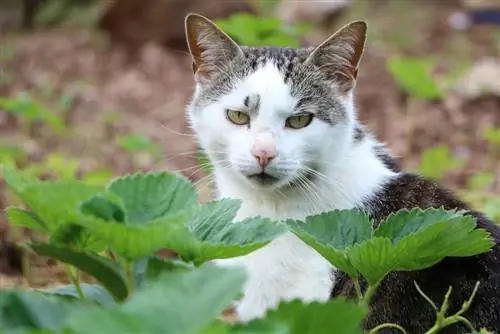
In the garden, freshly planted beds are particularly popular because they can be easily used as a cat toilet. Cats bury their “business”. A hollow is dug with great devotion, a seat is placed over it and, once the work is done, the hole and its contents are shoveled back up. This behavior usually also applies to urination, unless it is a tomcat that sets scent marks.
The drier and looser the soil, the more popular it is with kitties. Unfortunately, this is all the more unpleasant for the hobby gardener who has previously planted seeds or planted bulbs. After such a cat visit, the plants are guaranteed to no longer grow in a straight row. Maybe in some places nothing will work. If it specifically concerns individual beds, the following measures protect against damage caused by scratching:
- Keep soil moist by watering (dry places are preferred)
- Spread garden fleece
- Place the wire rack on the bed
- Distribute shrub cuttings between the sown rows
- Mulching the beds
As soon as the seeds sprout from the ground and reach a certain height, the bed loses its attractiveness. Cats fixate on an acceptable open space. The space between rows, which is usually only 15-20 cm, does not meet their needs. Bark mulch has proven effective between ornamental plants. Cats prefer fine-grained material. Pieces of bark that are used to cover beds and borders are definitely too big for them.
Keep cats at a distance
The cat repellent probably affects not just beds, but the entire garden. If you have little sympathy for cats, you certainly don't want to feel bothered by neighboring cats in general. Especially since some kitties don't just limit themselves to the outside area. Some velvet paws even walk unabashedly into the house or make themselves comfortable on garden furniture. They leave their mark in the form of hair on loungers, benches and seats, especially when they are shedding their fur.
If you sit on a chair where a cat was previously lying, you will get cat hair on your pants. There may even be an allergy to animal hair, which manifests itself in coughing and sneezing, red eyes or skin reactions. In these cases, it is all too understandable that cats are among the unwelcome guests. The following methods drive away cats:
Clap your hands strongly
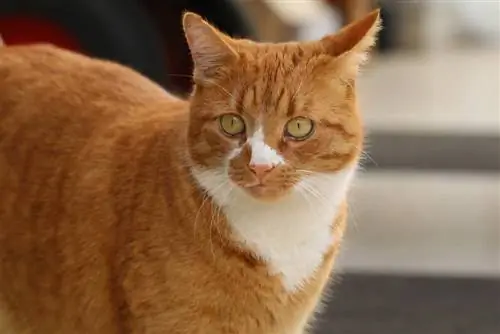
Kitties cannot be trained, at least not the way dogs are trained. The free spirit of these animals knows neither rules nor submission. But that's exactly what makes these creatures so fascinating for many people. Despite very good hearing, cats pay little or no attention to a “no” or a request to leave. In order to get them to leave the garden, completely unexpected acoustic events are required. A cat does not react to familiar noises that are classified as harmless. Clapping your hands comes up quite spontaneously, something the animal doesn't expect. Alarm bells ring immediately. Kitties respond to frightening situations by attacking or fleeing. With no prospect of a successful offensive, the cat quickly runs away. Instead of clapping your hands, you can also make these loud noises:
- shrill sound of a referee whistle
- Hit a wooden spoon on a pot
- Make the balloon squeak by releasing the air
- rattling with a ratchet
Cats have very good learning and memory abilities. Places that bring bad experiences to mind will be avoided in the future. But unfortunately it's not that simple. Because a kitty doesn't give up too quickly. Only after experiencing several moments of shock does the cat back down in the long term.
Spray with water
Water is essential for domestic cats to drink. But any further contact with the wet element is carefully avoided. There is even a real aversion to water. Scientists attribute this to the loss of body odor when bathing. Cleanliness is still very important, although grooming is carried out exclusively with the tongue. The antipathy towards water can be used to scare away cats. Suitable are:
- Water gun
- Water hose
- Waterjet Animal Repeller
Ideally, a sprayer is always available so that it can be used immediately if necessary. Waterjet animal repellers are constantly on the lookout. As soon as the electronic sensor detects movement, the device reacts with a jet of water in the respective direction, usually with an adjustable range of up to 10 m. The connection is made via a water hose. The line can be left turned on because water is only released when the detector receives pulses. Experience has shown that even with the water method, a single application does not lead to the cat staying away permanently. So don't lose your patience. Splashed with water several times, there will soon be no interest in your garden anymore.
Scents that cats don't like
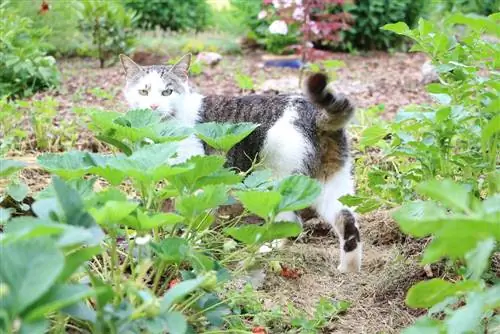
A cat's sense of smell cannot be compared to that of a dog, but cats have more than three times as many olfactory cells as humans. As a result, smells often determine behavior. The highly developed noses react sensitively to various scents. Cats usually steer clear of the following intensely smelling plants and substances:
- Fuck-off-plant
- Anti-cat spray
- Lemon
- Vinegar
- Pepper
- Coffee grounds
The smell method does not work equally well for all cats. Furthermore, the efficient radius in each case is only up to 5 m. In order to create a thorough effect with the piss-off plant, for example, it is recommended to use several specimens in larger outdoor areas. As with the anti-cat spray, which is primarily suitable for spraying paths and places, it is the essential oils of the plant that make cats uncomfortable staying nearby.
The acids in lemon juice and vinegar irritate the mucous membranes. When dripped onto rags, the strong smell forces cats to leave the place. As soon as cats sniff a foreign territory, finely ground pepper triggers a sneezing reflex. Dried coffee grounds also give off a smell that cats hate. The powder that is spread also sticks to the paws. The next time you clean, the unpleasant aroma will be unpleasant.
Defense via ultrasound
Plunged into the ground with a rod, a motion detector-controlled cat deterrent, usually based on infrared sensors, produces an alarm sound as soon as a cat walks past. The special advantage: The tones are at a frequency that is not or only minimally perceived by people. However, the cat's good hearing picks up the noises and classifies them as horrible and repulsive, so that the animal quickly disappears. Ultrasonic cat deterrent devices are operated either with batteries or with the help of a solar module.
Optical deterrents
A method common to crows can be transferred to cats. Reflective objects moving in the wind trigger feelings of fear in corvids and other intruders. To turn your garden into a scary place for cats, choose from:
- Aluminum tires
- old and defective CDs
- shiny metal pieces
- Mirror
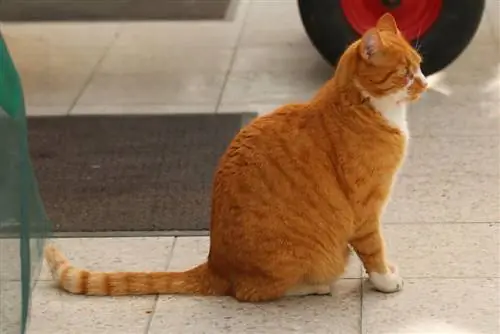
You can distribute the reflective elements in trees or bushes or hang them on a stretched cord. It is important that free airflow is maintained so that the reflection constantly varies. Aluminum strips rustle in the wind, and when other objects are lined up so that they collide with every breeze, there is also a frightening background noise.
Tip:
Did you know that cats are considered good luck charms in China? Perhaps this perspective will help reduce resentment towards unexpected cat visits.
Having a cat yourself
Finally, a method that is only suitable for some of the garden owners affected, because it requires a proper affection for cats. Getting your own cat proves to be very effective in blocking the way of strange cats into the garden. Both male and female animals keep their territory clean. The four-legged friends consider the house, yard and adjacent green area to be their personal territory. Cats are mostly individualists who do not tolerate competition. If a stranger invades the familiar zone, heated debates ensue, if necessary with the use of claws and teeth.

